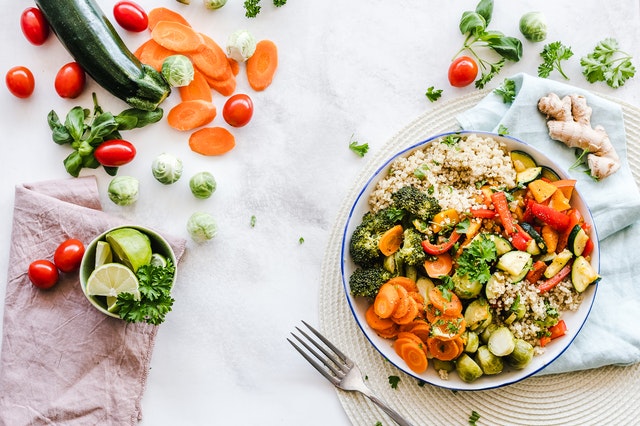The Power of Digestion in Ayurveda
Ayurveda’s aim is to have a long, happy and healthy life. The key to it is our metabolism, as all diseases have its origin in an imbalanced metabolism. The metabolism is therefore the central point we need to take care of if we want to restore health. The term metabolism refers commonly to the breakdown of food and its transformation into energy. As a result, we metabolise everything that we drink and eat, and the substances that we do not need anymore are eliminated. This process is the basis for our body to maintain itself.
According to Ayurveda we need a harmonious and functioning digestion to stay healthy and to prevent illnesses and imbalances. It is about strengthening our digestive fire, Agni, or also ensuring that it does not become too strong. In other words, we want to bring our Agni into optimal balance.
The four Types of Agni
In Ayurveda, we assume that everyone was born with an individual constitution. This constitution is unchangeable, but it may very well be in balance or not due to our habits and lifestyle. This type of constitution is called Prakriti and defines a person’s unique constitution in balance. However, if we get into an imbalance, we call it Vikruti. Therefore, we want to find out what we currently have too much or too little of, in other words, if our digestive fire is too weak or too strong.
Agni is located in the solar plexus area, the 3rd chakra, in the small intestine area. We want to eat things that burn clean and smooth. Then we experience a glow. If that is not the case, we can experience bloating, headaches, skin impurities, gas and other symptoms of digestive issues.
Without Agni it would be impossible to digest food and emotions. Consequently toxins can accumulate in the body and mind if our digestive fire does not burn optimally.
Agni is the main source of life and if you worship Agni, you will be blessed with perfect health. – Dr. Vasant Lad on Ayurveda
Ayurveda talks about four different states of Agni: regular or optimal, irregular, too intense, and too slow and weak.
1. Sama Agni: optimal / balanced digestion
Sama Agni means that the Agni is burning hot and clean. If we have a normal and optimal digestion, we have a complete bowel movement once or twice a day. The bowel movement is an important factor in assessing our digestive fire. When you have a complete emptying you know it. The stools have the consistency of a ripe banana, shaped but smooth and soft. Ideally, you should empty yourself within an hour of getting up, without using coffee or other home remedies.
Other characteristics of an optimal digestion are that you feel energised throughout the day. This Agni type has no afternoon low and no digestive discomfort. The immune system is stable and the mind is clear and alert. They are fueled from the inside out.
2. Vishama Agni: variable and sensitive digestion
This type is prone to digestive irregularities due to an erratic fire. The digestion is not steady, but fluctuating. Sometimes it is too fast and frequent, maybe even liquid. Sometimes it is too slow, sometimes too hard and often too seldom. The dosha associated with this type is Vata. When Vata gets stirred up in their mental body, it starts to affect their digestion. The energy from the digestion centre moves up in the brain and is missing in the digestion organs. As a result, Agni is too cold and the food cannot get properly digested. This digestive type often suffers from irregular hunger, weak immune system, and frequent digestive disorders such as: bloating, constipation, indigestion, digestive pain and cramps.
Also travelling and erratic eating patterns affect this Agni type. They often suffer from food allergies and intolerances. Furthermore they feel easily nervous, insecure, unworthy, worried and unprepared.
The bowel movement of Vishama Agni is marked by:
- often dry and hard, small pieces, rabbit pellets
- suffering easily from gas
- bloated belly
- dark colour and a strong smell
- sometimes less than once per day or incomplete defecation
- changes between diarrhoea and constipation
You don’t know your Dosha? Then take the Dosha quiz and learn more about your unique body constitution.
3. Tikshna Agni: too hot and too quick digestion
When we have too much heat in the system, our digestion runs fast or even too fast. It’s like you put oil on a fire. This digestive type often struggles with thin and loose stools due to a digestive fire that is too hot. There is too much bail in the system. The digestion process is too quick and the nutritions cannot be properly absorbed and malnutrition can occur. They sometimes have 3-5 bowel movements per day. This leads to constant hunger and they can eat huge quantities.
In addition to that there might occur: diarrhoea, heartburn, hyperacidity, gastritis and stomach pain. These people get easily hangry. When they are hungry, they need to eat something very quickly, otherwise they can get easily grumpy. We often find here very intense people who tend to impatience, irritability, frustration and over-working.
The bowel movement of Tikshna Agni is marked by:
- often soft, unformed and diarrhoea-like
- more than twice a day
- a lighter colour, sometimes even yellowish
- a strong smell
Sign up for my free “7-Days to Boost your Metabolism” course and learn the basic principles of Ayurveda for a properly functioning metabolism. Find better sleep, boost your immune system and have a strong digestion.
4. Manda Agni: slow and sluggish digestion
The sluggish digestion of Kapha constitutions is characterised by too little digestive fire. The stomach is too wet and they extract too little from the food. Therefore, they often need less food than the other two doshas, which is very difficult for them because of their love for food. The weak digestive fire cannot digest large amounts of food. They are not very hungry, but often have a big appetite. Due to the sluggishness of their digestion, they tend to feel full and heavy after eating.
The lungs are right next to the stomach. As a result, there can be a lot of congestion, trouble breathing, mucus in the sinuses and even vomiting of salvia. This type easily get overweight, obese, congested and is prone to seasonal allergies. Feelings of sluggishness, depression, sadness, overthinking, lethargy, drowsiness and brain fog can be present.
The bowel movement of Manda Agni is marked by:
- often slowly and less than once a day
- possibly with mucus
- sticks to the toilet bowl, the need of a lot of toilet paper
- is light brown and clay-like
What you can do
An important step to a healthier body is to become aware of our bowel movements. All of this may sound strange at first, as we are not used to talk about bowel movements in our society. However, it is an important tool to find health in Ayurveda. It gives us a lot of information about what is currently not working properly. This helps us to see what we need to do in order to regain health.





